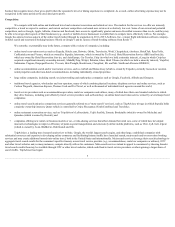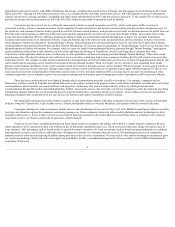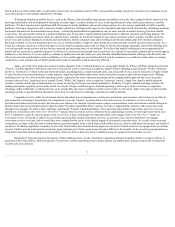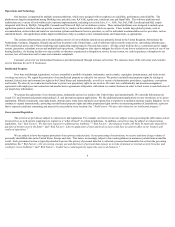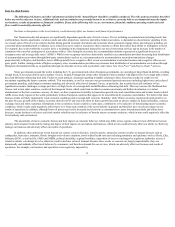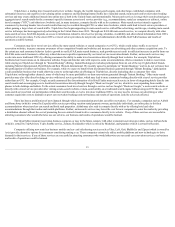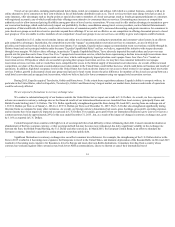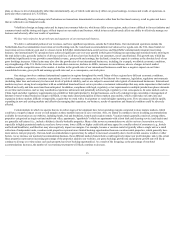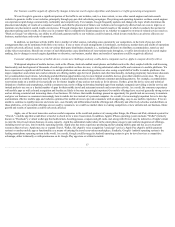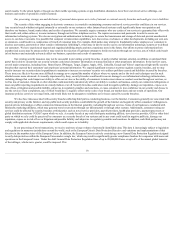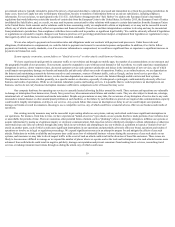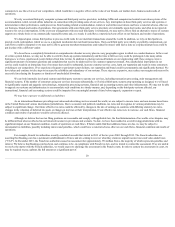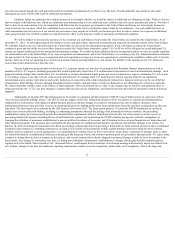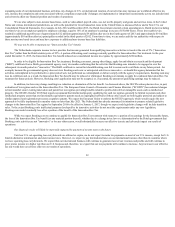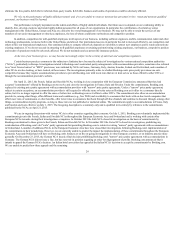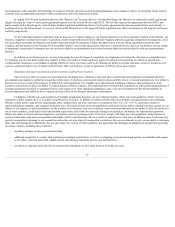Priceline 2015 Annual Report Download - page 18
Download and view the complete annual report
Please find page 18 of the 2015 Priceline annual report below. You can navigate through the pages in the report by either clicking on the pages listed below, or by using the keyword search tool below to find specific information within the annual report.
plans or choose to travel domestically rather than internationally, any of which could adversely affect our gross bookings, revenues and results of operations, in
particular when expressed in U.S. Dollars.
Additionally, foreign exchange rate fluctuations on transactions denominated in currencies other than the functional currency result in gains and losses
that are reflected in our financial results.
Volatility in foreign exchange rates and its impact on consumer behavior, which may differ across regions, makes it more difficult to forecast industry and
consumer trends and the timing and degree of their impact on our markets and business, which in turn could adversely affect our ability to effectively manage our
business and adversely affect our results of operations.
We face risks related to the growth rate and expansion of our international business.
We derive a substantial portion of our revenues, and have significant operations, outside the United States. Our international operations include the
Netherlands-based accommodation reservation service Booking.com, the Asia-based accommodation reservation service agoda.com, the U.K.-based rental car
reservation service rentalcars.com and, to a lesser extent, KAYAK's international meta-search services and OpenTable's international restaurant reservation
business. Our international OTC operations have achieved significant year-over-year growth in their gross bookings (an operating and statistical metric referring to
the total dollar value, generally inclusive of all taxes and fees, of all travel services booked by our customers, net of cancellations). This growth rate, which has
contributed significantly to our growth in consolidated revenue, gross profit and earnings, has declined, a trend we expect to continue as the absolute level of our
gross bookings increases. Other factors may also slow the growth rates of our international businesses, including, for example, worldwide economic conditions,
any strengthening of the U.S. Dollar versus the Euro and other currencies, declines in ADRs, increases in cancellations, adverse changes in travel market
conditions and the competitiveness of the market. A decline in the growth rates of our international businesses could have a negative impact on our future
consolidated revenue, gross profit and earnings growth rates and, as a consequence, our stock price.
Our strategy involves continued international expansion in regions throughout the world. Many of these regions have different economic conditions,
customs, languages, currencies, consumer expectations, levels of consumer acceptance and use of the Internet for commerce, legislation, regulatory environments
(including labor laws and customs), tax laws and levels of political stability, and we are subject to associated risks typical of international businesses. International
markets may have strong local competitors with an established brand and travel service provider or restaurant relationships that may make expansion in that market
difficult and costly and take more time than anticipated. In addition, compliance with legal, regulatory or tax requirements in multiple jurisdictions places demands
on our time and resources, and we may nonetheless experience unforeseen and potentially adverse legal, regulatory or tax consequences. In some markets such as
China, legal and other regulatory requirements may prohibit or limit participation by foreign businesses, such as by making foreign ownership or management of
Internet or travel-related businesses illegal or difficult, or may make direct participation in those markets uneconomic, which could make our entry into and
expansion in those markets difficult or impossible, require that we work with a local partner or result in higher operating costs. If we are unsuccessful in rapidly
expanding in new and existing markets and effectively managing that expansion, our business, results of operations and financial condition could be adversely
affected.
Certain markets in which we operate that are in earlier stages of development have lower operating margins compared to more mature markets, which
could have a negative impact on our overall margins as these markets increase in size over time. Also, we intend to continue to invest in adding accommodations
available for reservation on our websites, including hotels, bed and breakfasts, hostels and vacation rentals. Vacation rentals generally consist of, among others,
properties categorized as single-unit and multi-unit villas, apartments, "aparthotels" (which are apartments with a front desk and cleaning service) and chalets and
are generally self-catered (i.e., include a kitchen), directly bookable properties. Many of the newer accommodations we add to our travel reservation services,
especially in highly penetrated markets, may have fewer rooms, lower ADRs or higher credit risk and may appeal to a smaller subset of consumers (e.g., hostels
and bed and breakfasts), and therefore may also negatively impact our margins. For example, because a vacation rental is typically either a single unit or a small
collection of independent units, vacation rental properties represent more limited booking opportunities than non-vacation rental properties, which generally have
more units to rent per property. Our non-hotel accommodations in general may be subject to increased seasonality due to local tourism seasons, weather or other
factors. As we increase our non-hotel accommodation business, these different market characteristics could negatively impact our profit margins; and, to the extent
these properties represent an increasing percentage of the properties added to our websites, our gross bookings growth rate and property growth rate will likely
continue to diverge over time (since each such property has fewer booking opportunities). As a result of the foregoing, as the percentage of non-hotel
accommodations increases, the number of reservations per property will likely continue to decrease.
15


